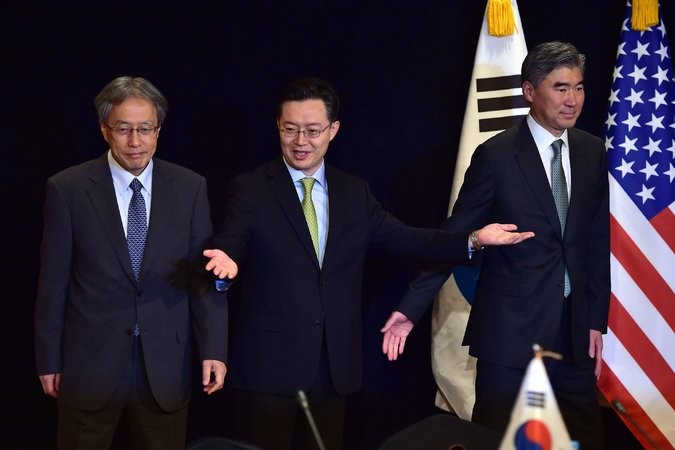(VOVworld) – Increasing pressure and sanctions on the Democratic People’s Republic of Korea to bring Pyongyang back to the negotiating table was the focus of a high-level meeting between the US, Japan, and the Republic of Korea in Seoul on May 27. Given Pyongyang’s recent “provocative acts”, a tough stance by 3 of the 6 countries involved in the 6-party talks on North Korea’s nuclear program will only increase tension in the region.
 |
| The top nuclear envoys, from left, Junichi Ihara of Japan, Hwang Joon-kook of South Korea and Sung Kim of the United States at a meeting in Seoul, South Korea, on Wednesday. (Credit Jung Yeon-Je/Agence France-Presse — Getty Images) |
Top envoys from the US, Japan, and the Republic of Korea shared a “sense of urgency” over what they called “seriousness in the advancement of North Korea’s nuclear capability.”
South Korea’s nuclear envoy Hwang Joon-kook warned that North Korea will face increasing pressure from the international community if it continues its provocative acts and diplomatic and economic sanctions may soon be applied. The delegates pledged to work closely on the Korean issue and work to maintain consensus with Russia and China.
Actions increase tension
Following the test of a submarine-launched ballistic missile last week, North Korea claimed it has built several military bunkers on an island close to South Korea.
South Korea said Galdo island, approximately 2.5 kilometers north of the Northern Limit Line, is equipped with 122-millimeter multiple rocket launchers and guard posts to monitor the movement of South Korean patrol vessels. If clashes occur between the two Koreas, Galdo island will be the closest site to launch attacks on South Korean islands. At least 5 military stations have been built which are serious threats to Seoul.
The South Korean military has deployed Spike missiles which have a range of about 20 kilometers on the islands of Yeonpyeongdo and Baengnyeongdo to help defend the region.
The US and South Korean armies have mapped out strategies that include options to launch pre-emptive attacks on North Korea’s submarines. The two have discussed deploying submarines capable of identifying early signs of a missile test launch. Seoul plans to purchase a radar system from Israel to expand its coverage. The the US Navy’s Aegis cruisers can intercept submarine-launched ballistic missiles.
Fragile prospects for talk resumption
6-party talks on denuclearizing of the Korean peninsula have been stalled since December, 2008. The US and its allies wanted Pyongyang to show its goodwill with nuclear commitments in return for aid and certain political concessions but Pyongyang asked for recognition as a nuclear power. This dilemma has persisted for years with frequent missile tests, provocative drills, and warnings increasing tensions between the two Koreas.
Prospects for an early resumption of talks, according to analysts, are small. The DPRK has not only test-fired submarine-launched ballistic missiles but has announced its ability to miniaturize nuclear warheads so they can be fitted to ballistic missiles. Hope is now placed on China, a major ally and sponsor of North Korea. Special envoys of the US and South Korea will arrive in Beijing to meet their Chinese counterpart on Thursday, hoping that China with its influence will persuade North Korea to give up its nuclear ambition. In the context of the US’s pivot to Asia, China gives higher priority to its alliance with North Korea than to stopping North Korea’s nuclear program. Analysts predict that China will say Pyongyang’s nuclear issue should be settled through dialogue.
Differences and a lack of trust have made it difficult for the two Koreas to reconcile. Both need to compromise to restart productive talks. Analysts say any action by either side, offensive or defensive, could increase instability on the Korean peninsula, making it harder to defuse tensions in the region. So far no good solution to the problem of Pyongyang’s nuclear efforts has been found.